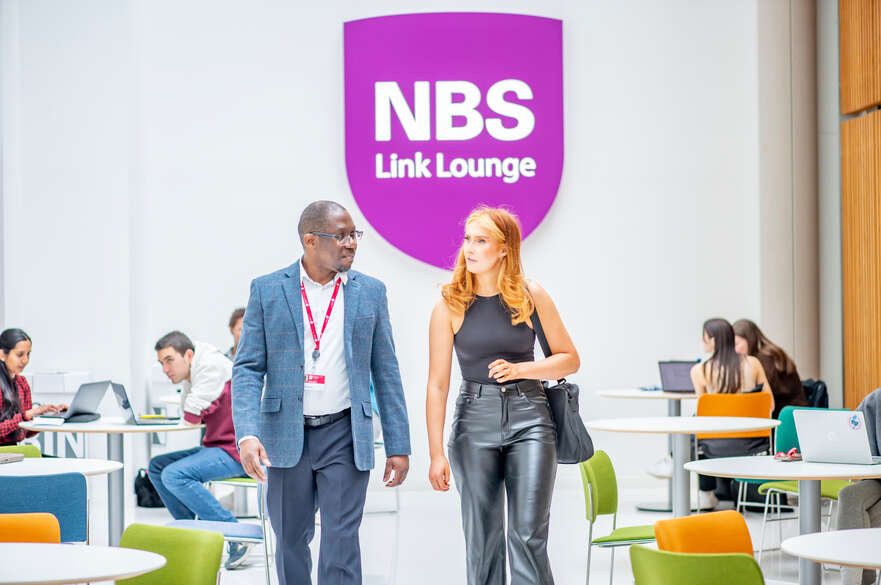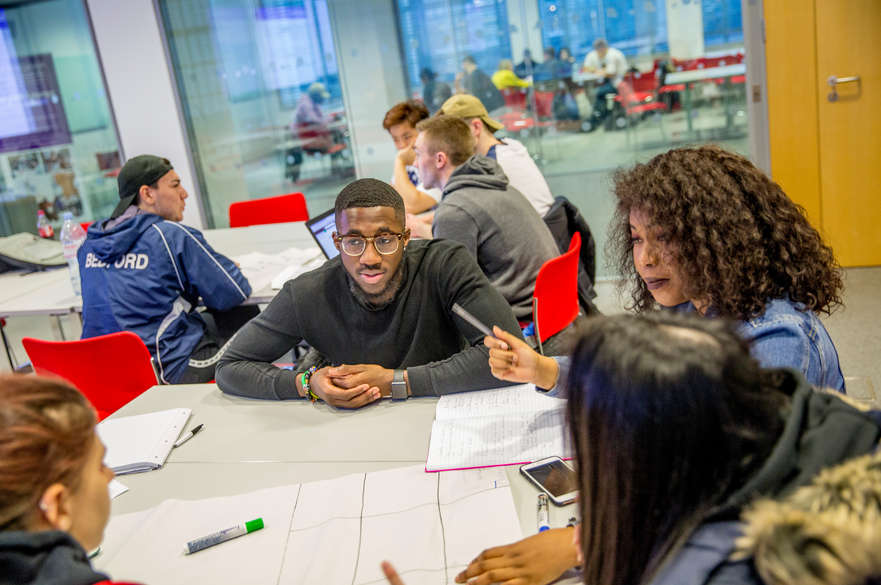Project Management MSc
About this course
Our MSc Project Management course has been designed to equip you with all the necessary skills and knowledge to design, plan and execute projects successfully. Project Management is a growing field with a strong focus on finding graduates with strong theoretical background in Project and Programme Management.
The principle aim of this course is to offer you a specialist postgraduate course in project management that is both practically and academically relevant to the current demands in project and programme management.
In your third semester, you’ll choose an experiential project. With the opportunity to use your skills in a real-world setting, you can choose from completing a consultancy experience project or a business research project.
This course is accredited by the Association for Project Management (APM) the Chartered Body for the project management profession. This prestigious accreditation ensures a high standard of relevance and excellence. As well as gaining a recognised Masters qualification, you’ll have the opportunity to take up membership of the APM meaning you are on an accelerated pathway to achieving chartered status in your future career, as well as having a thorough understanding of how to deliver projects successfully.
What you’ll gain from this degree?
- demonstrate knowledge and understanding of the primary theories and concepts relating to the field of Project and Programme Management.
- critically evaluate ethical and sustainability issues in Project Management.
- learn to apply knowledge, tools and techniques to resolve issues in new and diverse situations within the Project Management discipline.
- effectively use information and communication technologies relevant to the Project Management discipline.
- in addition to key subject areas, you will also be taught a number of skills that will help you stand out of the crowd. These include for example negotiation, critical thinking, problem solving and Microsoft Project.
-
This course is accredited by the Association for Project Management (APM) the Chartered Body for the project management profession.
-
You will be allocated a Mentor at the beginning of the academic year and you will meet with them regularly throughout the year. Mentors help you make the most of your time at NBS.
What you’ll study
At NBS you can create a personalised learning experience, giving you a unique Masters degree that equips you with the skills you'll need, for the career you want. Each of the modules will be delivered over a four week period, with teaching delivered in three weeks and the fourth week left clear for assessment work. This enables you to focus on one subject at a time, whilst allowing time for preparation and assessment work.
- Programme overview
- Semester one
- Semester two
- Semester three
- Ongoing learning/professional development/placement opportunities
- International study tour
Semester one
- Project Management Principles
- Maximising Project Success
- Project Management Methodologies
Semester two
- Project planning and Control
- International Project Leadership
- Project and Programme Strategy
Semester three
Your choice of final semester project. Experiential projects include:
- Consultancy Experience Project; or
- Business Research Project
Module for those undertaking the 2 year course
- Placement Diploma in Industrial Experience
Semester one
Project Management Principles (20 credits)
This module will introduce you to the key principles, methodologies, tools and techniques of project management. You will be introduced to core definitions and concepts including project characteristics, making you able to demonstrate an understanding of project environment and lifecycle, a project managers role, project stakeholders, risks, common failures and how to address them.
Maximising Project Success (20 credits)
This module aims to show you how to apply project management techniques in real projects to achieve success. It also looks at challenges modern project managers face and ways in which to realise benefits.
Project Management Methodologies (20 credits)
This module aims to explore the variety of Project Management methodologies, frameworks, and certifications available while future-proofing students for career progression. In particular, the module highlights the decisions that lay before managers in selecting and adopting a viable PM methodological approach, and making a sound business case for it to programme and Portfolio leads.
Semester two
Project Planning and Control (20 credits)
This module will build upon the 'Principles of Project Management' module. You will learn specialised skills and techniques aimed to improve your skills in planning, monitoring and controlling projects.
International Project Leadership (20 credits)
The aim of this module is to provide students with a critical understanding of how to effectively coordinate and lead cross-cultural/diverse project teams to maintain competitive advantage for their business in the increasingly challenging global contexts. You will build your knowledge and skills in areas such as people management, team development and leadership. The module will include a Collaborative Online International Learning project or an international field trip.
Project and Programme Strategy (20 credits)
This module aims to foster a critical understanding of strategy and its relationship with projects. You will explore project, programme and portfolio management in the context of wider theory incorporating the Theory of Constraints. You will also demonstrate an understanding of strategic issues in project management in the context of wider theory.
Semester three
In your final semester you'll take on a experiential project, giving you a fantastic opportunity to use the theories and knowledge you've gained to produce a challenging, meaningful piece of work. Projects include:
Consultancy Experience Project (40 credits)
Working as part of a team, you'll undertake focused research, developing your professional skills, managing a complex project and delivering results in a real business situation. You'll present your findings to the client and learn valuable project management tools and concepts.
Business Research Project (40 credits)
This project is a more traditional piece of independent research, creating an academic research paper, presentation and methodological reflection. Because we believe experiential learning is so important, this project is only available to students with significant prior work experience or a desire to progress to a PhD.
For more information about semester three options please visit our Experiential Projects page.
Ongoing learning
Throughout the year you will also study the following modules which will help you understand how to manage your own continuous personal and professional development (PPD).
Professional Practice (10 credits)
The purpose of the module is to increase your understanding of your own personal and professional development needs to enhance your business acumen and improve your employability. The module utilises a series of taught sessions to help you explore the human side of enterprise and deploys a series of diagnostics tests to help you evaluate yourself and develop an individual action plan. It will combine teaching with individual and group mentoring to help you execute your plan. The module also promotes engagement with internal and external workshops, lectures, experiential learning opportunities and extra-curricular events to help you expand your knowledge and skills, whilst challenging your attitudes and behaviours. You will gain a deeper understanding of the importance of continuous professional development from the perspective of professional bodies, such as the CIM, APM and SPE.
Research Methods for Project Managers (10 credits)
The purpose of the module is for you to acquire the knowledge and skills to be able to formulate, plan and conduct effective research to inform management decisions, through conducting a small-scale research project.
Professional development
We are pleased to announce that our MSc Project Management course has been approved by the the Association for Project Management (APM). This prestigious accreditation ensures a high standard of relevance and excellence. As well as gaining a recognised masters qualification, you will be given the opportunity to take up a membership with the APM which is a valuable tool for networking and building connections.
You can read our case study on the APM website.
Placement opportunities
Placement Diploma in Industrial Experience (2 year course only)
This module aims to develop your understanding of the business and commercial environment. You will apply relevant prior knowledge and skills in the business environment increasing your commercial awareness. On completion of the module, you will have developed a range of skills and have a practical insight into the world of work and possible career opportunities.
Please note that placements are only available for students beginning their studies in September and is not available for students starting in January.
If you start your Masters in September you can apply for the two-year option where you can add a year’s work placement onto your course. It’s a great way to put your learning into practice and gain valuable real-world experience to help boost your career prospects once graduating.
Your placement year will last up to 48 weeks (minimum 36 weeks). If you are unable to take a full year's placement, but have completed the minimum 36 weeks you can qualify for a Placement Diploma in Industrial Experience. If you undertake a placement, you must take up the Business Research Project in Semester Three.
Please note that placements are not guaranteed and you will need to work hard in securing one during your first semester. We have a dedicated Employability team who are here to help and support you during the placement process with CV writing, creating a LinkedIn page, interview tips, where to search for a placement etc. You can visit the Employability team’s page for further information.
Placements are only available for students beginning their studies in September.
Please contact us through Ask NTU if you have any questions about securing placements.
The study tour takes place each year, meaning that all students, will have the opportunity to take part. All essential field trip costs will be included in your course fees (NB: there may be the opportunity to take part in optional field trips, which do incur additional costs), and all students will be provided with help and support in applying for the necessary visas (which may incur additional costs).
The destination and style of the trip varies each year, but previous destinations have included:
- Toulouse, FR
- ISCTE Business School in Lisbon, PT
- Zagreb School of Economics in Zagreb, HR
- University of Brescia in Brescia, IT
- DePaul University in Chicago, USA
While abroad you will have the chance to take part in a number of activities, including industry visits, networking opportunities, attending lectures and seminars at a partner institution, and of course some sight-seeing. The trip is also normally linked to your International Project Leadership module, giving you the opportunity to meet the organisation you are working with, and present your ideas directly back to them at the end of the trip.
The trip has proven itself to be a key factor in the success of the programme, with students benefiting from the business and cultural aspects of it, with students highlighting their personal development and utilisation of it for CPD as well as securing job and placement opportunities.
We regularly review and update our course content based on student and employer feedback, ensuring that all of our courses remain current and relevant. This may result in changes to module content or module availability in future years.
Don’t just take our word for it, hear from our students themselves
Video Gallery
How you're taught
Teaching and Learning
Nottingham Business School adopts a distinctive approach to the design of student learning opportunities. Your learning is structured around theory, practice, experience & observation, and reflection & improvement. At each level (course, module and session), you will study different theories, concepts and approaches and be given opportunities to apply these in a range of practical settings. The aim is to enhance your understanding through the direct experience of business, where you will have opportunities to observe business practices and behaviours (including your own) and analyse these using theoretical knowledge. It is our intention that by reflecting on these experiences, you will be able to use these theories to guide your actions and decisions in a business context or even consider how a theory itself might be improved. In this way, we aim to enhance the quality of your learning.
You'll also use our virtual learning environment, which is a flexible web-based system that gives you 24-hour access to module learning materials and allows you to submit coursework electronically from anywhere in the world.
Academic Mentors
Every postgraduate student will be allocated an Academic Mentor at the beginning of the academic year and you will meet with them regularly throughout the year. Academic Mentors help you make the most of your time at NTU. They will support you in developing and enhancing the qualities and transferrable skills necessary for your studies, career progression, professional and personal development.
Assessments
A range of assessment methods are used across the course, the choice of which reflects the needs and demands of the different types of module. Some modules will assess the ability to work collaboratively in a team and others will assess individual capability. Types of assessment will range from group presentations including essays, reports, financial analyses, literature reviews and research based projects. There are no exams on this course.
The interactive nature of the taught sessions offers opportunities to gain feedback on your performance before being formally assessed and increasing use is made of eLearning to further support the feedback process.
In-sessional English language support
In-sessional English language classes are offered to international students at no extra cost. The classes aim to provide focused support in the skills you need in order to develop your English in your subject area.
Further information please contact the Nottingham Language Centre based in the Djanogly building on City Campus:
Tel: +44 (0)115 848 6156 | Email: englishsupport@ntu.ac.uk | Website: www.ntu.ac.uk/nlc
Personalisation
We know our postgraduate students are a diverse group, with different levels of academic knowledge in their chosen area of study, different cultural and educational backgrounds, and varying levels of personal and professional skills and competencies.
At NBS we strive to ensure that these two motivating factors are nurtured and therefore supported. Our students are encouraged to practice and develop the skills and competencies required to critically reflect on their learning, and on their ability to apply this learning to their studies and to real world complex issues within the workplace. Through a series of curricula and extra-curricular initiatives, strengthened by tailored academic mentor support, NBS provides all our postgraduate students with the ability to participate in a range of challenging and unique activities, projects, events and experiences to enable our students to succeed in a competitive and dynamic global environment.
Careers and employability
APM Chartered Recognised Assessment
Studying on our MSc Project Management will put you in an excellent position in the graduate job market. The degree represents attaining Recognised Assessment (Route 1), meaning you are on an accelerated pathway to achieving chartered status in your future career, as well as having a thorough understanding of how to deliver projects successfully.
Our MSc Project Management degree attained Recognised Assessment by meeting the requirements for technical knowledge and being aligned with industry standards. It now features on the list of Route 1 assessments towards becoming a ChPP.

Careers and employability
At Nottingham Business School, we’re focused on your employability from the start of your postgraduate degree. We provide you with a learning experience that integrates theory and practice.
Project Management graduates gain skills that are transferable across a number of industries including automotive, oil and gas, aerospace and defence, IT, engineering, healthcare plus many more. Our excellent links with over 600+ companies ensure you are highly employable upon graduation. In recent years, our students have worked at a range of world-renowned organisations, including:
- 3M
- Barclays
- Boots
- British Telecom
- CISCO
- E.ON
- Experian
- Nottinghamshire Police
- Rolls Royce
- Volkswagen
- Waitrose
Please note all students will need to secure their own placements with the help of our Employability team. Above are examples of companies were students have successfully secured jobs after graduation.
Employability Team
We have a dedicated Employability Team who not only help you during your time with us but also following graduation, they’ll continue to support you by providing a number of services that will help kick-start your career.
Our Employability Team offer a wide range of support from one-to-one appointments with our specially trained consultants, to arranging recruitment fairs and skill building workshops.
Services they provide include:
- Finding placements, internships and part-time work
- Helping you to pursue self-employment
- Advice on taking gap years and time out
- Information and help on getting into volunteering
- Providing advice on further study.
As a student you will have access to our virtual learning environment, where you will be able to get in touch with our Employability team for CV support, application, interview and job hunting advice, career ideas and employer videos.
You can visit the Employability Team on your local campus every day during term time. They are also open outside of term time too, except on University closure days. So drop in, say hello, and get help with quick enquiries or book an appointment with a careers consultant from your school.
Campus and facilities
You’ll mainly be studying in our brand-new Postgraduate Centre, at the heart of our vibrant City Campus. Designed to support collaborative study, there’s a range of accessible teaching spaces, state-of-the-art technology, breakout areas, quiet work booths and a communal café. You can access dedicated market research reporting platforms and digital resources (e.g. Mintel, Passport, SPSS, and Adobe Creative Cloud) and a room equipped with Bloomberg terminals, which enables you to delve into industry-leading data, news and analytics.
NTU’s City Campus has everything you’ll need to keep occupied between lectures. As well as the Boots Library and its beautiful roof garden, there’s our superb Students’ Union building and two-storey, 100-station gym; a whole host of cafés, bars, restaurants and food outlets catering to every taste; our much-loved Global Lounge; performance and rehearsal spaces for musicians; and so much more!
If that’s not enough, just take a few steps off campus, and you’ll find yourself in the beating heart of Nottingham — one of the UK’s top 10 student cities, and one of the top 25 in all of Europe. It’s a city stuffed with history, culture, and well-kept secrets to discover at your leisure: enjoy lush green spaces, galleries, hidden cinemas and vintage shopping by day, and an acclaimed food, drink and social scene by night. For more details, why not take a Virtual Tour?
Entry requirements
UK students
One year: You will need an undergraduate degree equivalent to a UK undergraduate honours degree (2.2 or above) *
Two year: You will need an undergraduate degree equivalent to a UK undergraduate honours degree (2.1 or above)*
*must contain some evidence of quantitative ability.
Additional requirements for UK students
- All applicants will be required to demonstrate a commitment to the subject they wish to study and should demonstrate how their chosen programme of study will benefit them in their future career.
- One academic reference is required.
If you’re considering submitting an application for this course, but you have more than three years of relevant work experience, why not consider applying for our Master of Business Administration (MBA) course? Find out more about our MBA here.
Other qualifications and experience
We welcome applications from students with non-standard qualifications and learning backgrounds and work experience. We consider credit transfer, vocational and professional qualifications, and any work or life experience you may have.
You can view our Recognition of Prior Learning and Credit Transfer Policy which outlines the process and options available, such as recognising experiential learning and credit transfer.
Getting in touch
If you need more help or information, get in touch through our enquiry form.
International students
One year: You will need an undergraduate degree equivalent to a UK undergraduate honours degree (2.2 or above) *
Two year: You will need an undergraduate degree equivalent to a UK undergraduate honours degree (2.1 or above)*
*must contain some evidence of quantitative ability.
We accept equivalent qualifications from all over the world. Please check your international qualifications on our international entry requirements page.
English language requirements: See our English language requirements page for requirements for your subject and information on alternative tests and Pre-sessional English.
Additional requirements for international students
Postgraduate preparation courses (Pre-Masters)
If you need help achieving the academic entry requirements, we offer a Pre-Masters course for this degree. The course is offered through our partner Nottingham Trent International College (NTIC) based on our City Campus.
English language requirements
View our English language requirements for all courses, including alternative English language tests and country qualifications accepted by the University.
If you need help achieving the language requirements, we offer a Pre-Sessional English for Academic Purposes course on our City campus which is an intensive preparation course for academic study at NTU.
Other qualifications and experience
We welcome applications from students with non-standard qualifications and learning backgrounds and work experience. We consider credit transfer, vocational and professional qualifications, and any work or life experience you may have.
You can view our Recognition of Prior Learning and Credit Transfer Policy which outlines the process and options available, such as recognising experiential learning and credit transfer.
Sign up for emails
Sign up to receive regular emails from the International Office. You'll hear about our news, scholarships and any upcoming events in your country with our expert regional teams.
Getting in touch
If you need advice about studying at NTU as an international student or how to apply, our international webpages are a great place to start. If you have any questions about your study options, your international qualifications, experience, grades or other results, please get in touch through our enquiry form. Our international teams are highly experienced in answering queries from students all over the world.
Policies
We strive to make our admissions procedures as fair and clear as possible. To find out more about how we make offers, visit our admissions policies page.












